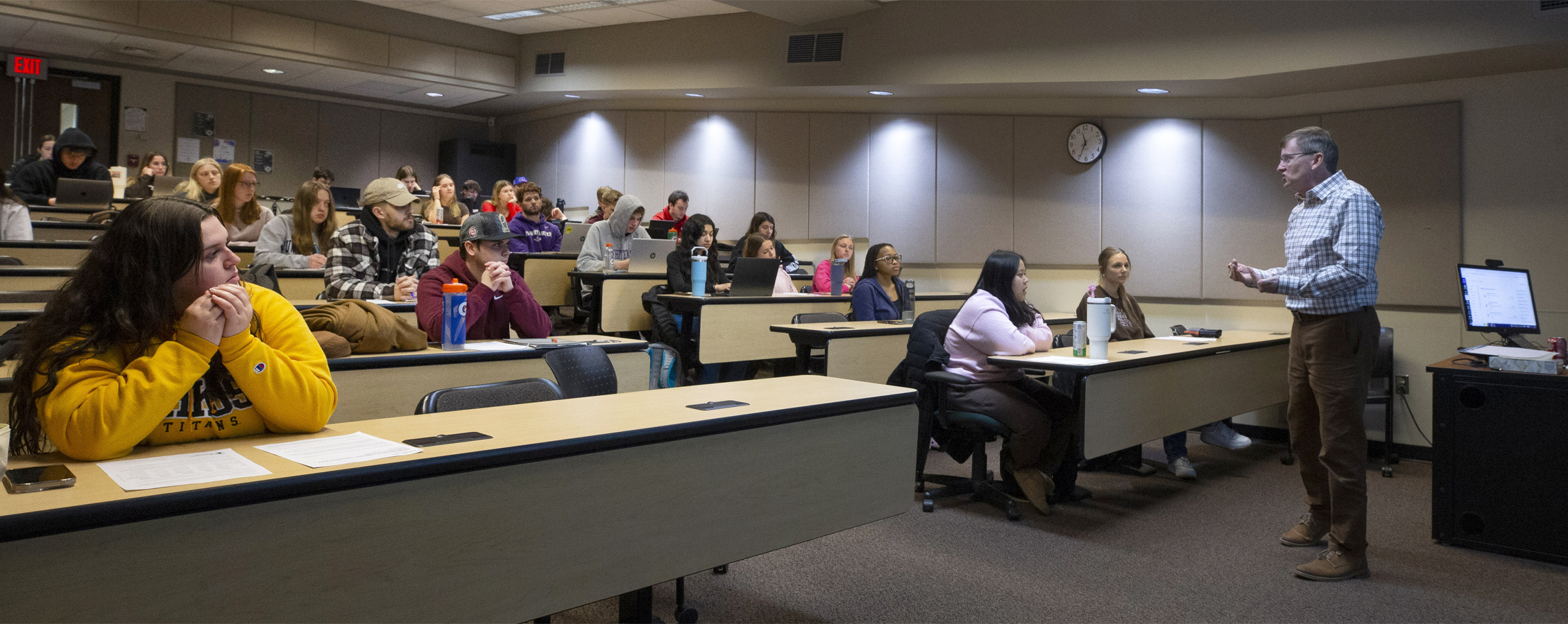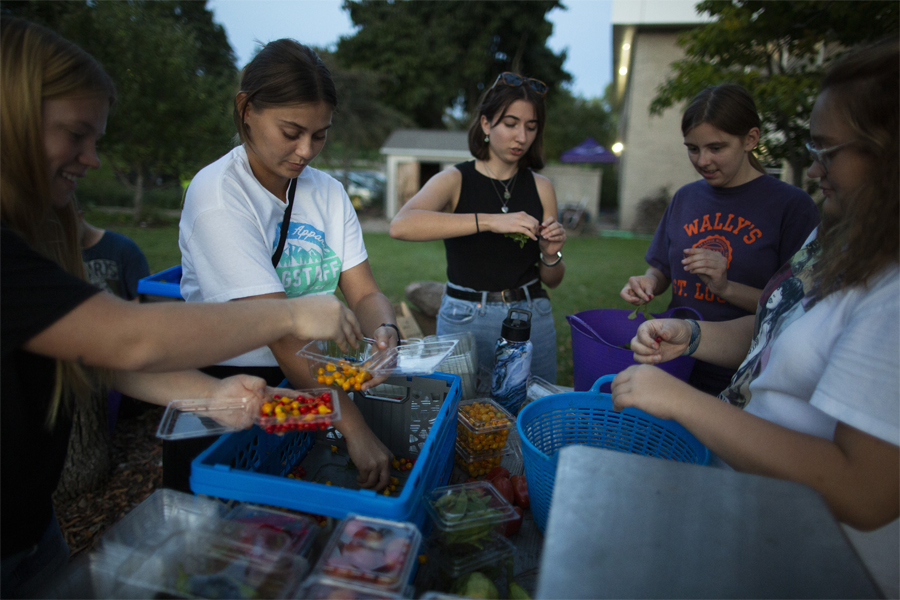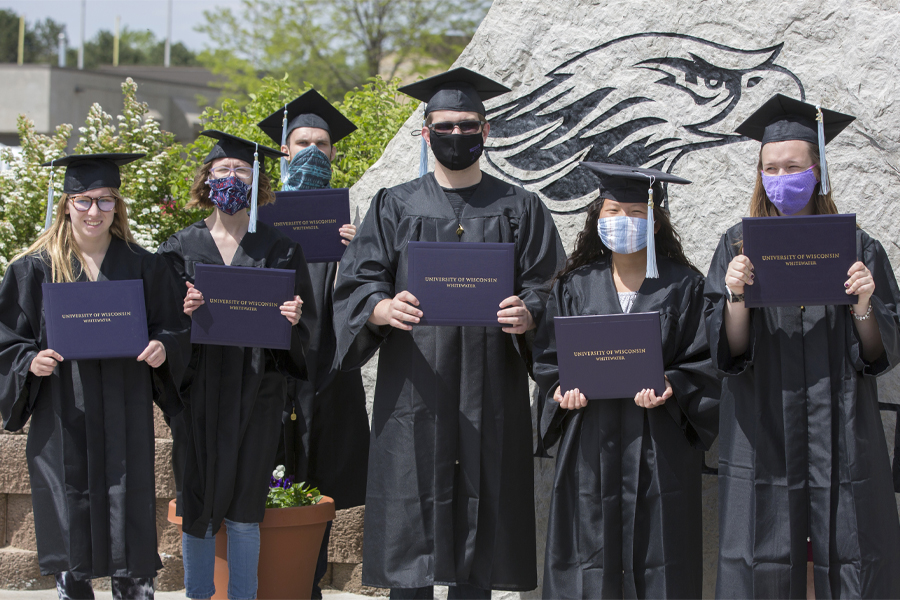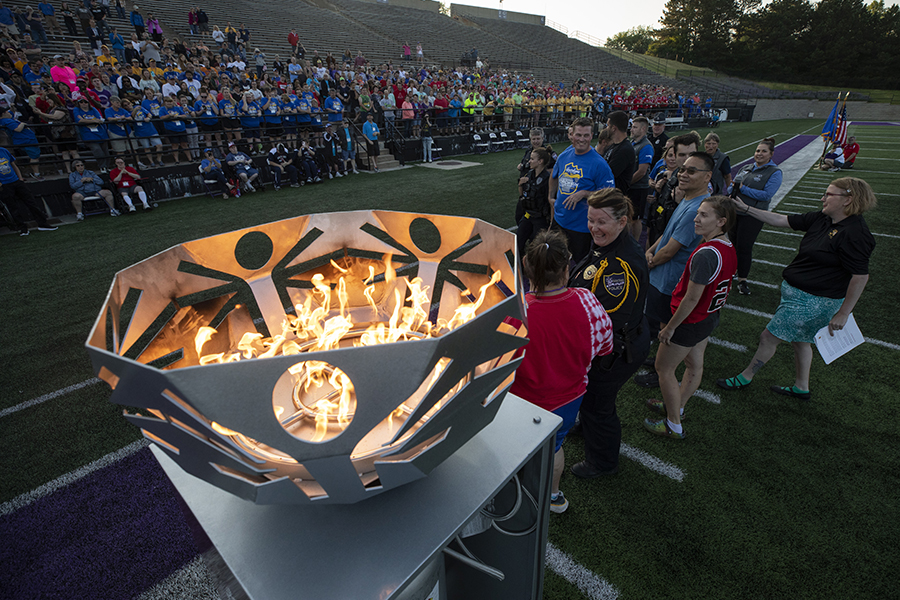UW-Whitewater Special Education program wins the Regent’s Teaching Award
April 01, 2024
Written by Kristine Zaballos | Photos by Craig Schreiner
The University of Wisconsin-Whitewater Department of Special Education, a program unique in the state with its mission to prepare professionals to become change agents in their support of individuals with disabilities and their families, has been named a recipient of the 2024 Universities of Wisconsin Board of Regents Teaching Excellence Award.
The award is made to an academic department, program or other academic unit that demonstrates exceptional commitment to and effectiveness in teaching.
The breadth and depth of UW-Whitewater’s Department of Special Education — which comprises both in-person and online undergraduate programs and an online graduate degree program, certificates designed to enhance professional development, international student teaching opportunities in Ecuador, Jamaica and Sweden, and the LIFE Program, which provides a complete, residential college experience for young adults between the ages of 18-25 who have an intellectual disability — reflects a call from the Board of Regents 50 years ago.
“In 1973 the Board of Regents designated UW-Whitewater with a unique, specific mission to provide exemplary services for students with disabilities,” said Amy Stevens, chair of the Department of Special Education. “Our department’s mission — to prepare professionals to become change agents who use evidence-based practices and critical thinking to support individuals with disabilities and their families across a variety of contexts — reflects the important charge of inclusivity and universal support that the board assigned to our campus.”

Amy Stevens, professor of special education, front, presides at a department meeting in Winther Hall on the UW-Whitewater campus.
Lana Collet-Klingenberg, interim dean of the College of Education and Professional Studies, cited the feedback she hears from schools that have UW-Whitewater student teachers in their classrooms as evidence of the department’s reputation in the state.
“In my role, I am regularly contacted by administrators from schools who praise us for how well prepared our teacher candidates are and to ask who we have graduating in that term who might be a good fit for their school.”
“Active learning is a way of life for the faculty in the Department of Special Education,” Collet-Klingenberg added. “As individuals and as a collective, they are always on the lookout for new ways to bring the classroom into the community and vice-versa.”

Lauren Zepp, assistant professor of special education, teaches in Special Education 487, the Science of Reading for Students with Disabilities, in Winther Hall on Monday, March 18, 2024.
Meeting the evolving needs of the state
Stevens cites as critical to the department’s success the deep and evolving level of critical reflection and thoughtful analysis of teaching practices.
“We are forward thinking,” said Stevens. “We don’t wait until we are told to do something. We look at the field and identify what the needs of professionals and teachers in this field are — and how we can fill them.”
One example is the SpecEd4U, an online Bachelor of Science in Special Education for working paraprofessionals who wish to become special education teachers.
“This program was developed in response to the dire shortage of special education teachers in Wisconsin and Illinois,” said Stevens. “The fourth cohort will be student teaching and graduating in fall 2024, and we are excited to see the program is growing and has student representation from across the U.S.”
Another example is the university’s online certificate in dyslexia and learning-based disabilities, the outcome of a conversation about 5 years ago with Jeremy Thiesfeldt, then representing the 52nd District in the Wisconsin State Assembly and serving as chair of the Assembly Education Committee.
“He was rightly pushing the need for better reading instruction to meet the needs of children with disabilities,” said Stevens. “I’d had a sabbatical at a dyslexia center, and saw the need for better skills for teaching reading skills.”

A student returns rented textbooks at the University Bookstore at the end of the fall semester on Wednesday, Dec. 15, 2021.
The Department of Special Education collaborated with state leaders in the field of dyslexia while developing the certificate, which was introduced in 2020, well ahead of Act 20, introduced in 2023 to require a statewide adherence to science-based early literacy instruction to address low reading proficiency across the state.
Other recent certificates geared toward meeting emergent needs are a graduate certificate in trauma-informed educational practices, tailored to education leaders, and an online graduate certificate in social emotional learning and mental health in schools, which is designed for teachers.

Rowand Robinson, left, professor of special education, teaches Special Education 201 — Disability, Race and Ethnicity in Society — in Winther Hall on Tuesday, March 19, 2024. Robinson recently served as interim chair of the department.
Serving a critical need for students with intellectual disabilities
In the announcement of the award, the Board of Regents cited the department’s success with underrepresented minority student retention, which exceeds all other majors in the College of Education and Professional Studies, and the department’s 76.5 percent graduation rate in addition to a post-graduation employment rate of 100 percent for undergraduate and graduate students who report working in their field.
Also singled out is the department’s Learning Is for Everyone program, a two-year college experience for young adults ages 18-25 who have an intellectual disability, recognized by the U.S. Department of Education as a comprehensive transition and postsecondary program.

UW-Whitewater LIFE program student Kevin Walther, left, waits with the Middleton Special Olympics team to parade into Perkins Stadium for the opening ceremony of the Special Olympics Wisconsin games in June 2023.
The first of its kind in the state, the LIFE program offers ample support, specialized instruction, on-campus residential living, and community integration, serving a critical need by providing access and opportunity for students who have historically been underrepresented in higher education.
Students in LIFE live in the same residence halls as other students on campus, are able to enroll in undergraduate courses with their nondisabled peers, and participate in campus life activities and student organizations.
“The program is hugely beneficial to the students that enroll in it, as well as students, faculty, and staff in our college and on campus, as they begin to see the students in the LIFE program as individuals who can achieve and work toward goals, just like our traditional undergraduate students,” said James Collins, a professor of special education who initiated and coordinates the LIFE Program. “It is also a revenue-generating program and one of the largest employers of students on campus.”
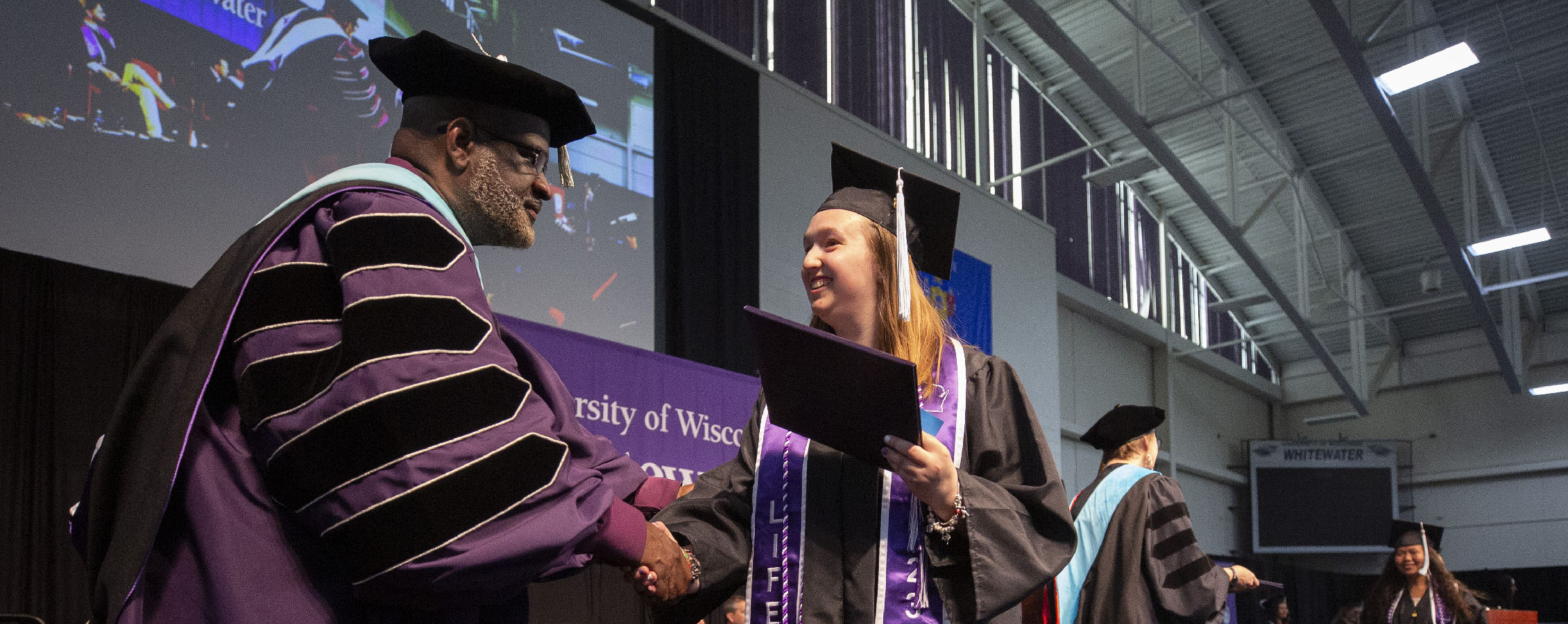
Alexis Orkfritz, right, is congratulated by Chancellor Corey A. King at the May 2023 commencement ceremony, held at Kachel Fieldhouse. A graduate of the advanced LIFE program, Orkfritz is from Baraboo.
To Collet-Klingenberg the LIFE program, which graduated its first cohort in 2021, exemplifies the teaching qualities being lauded in the Regents Teaching Award.
“This program embodies everything our Department of Special Education stands for — equity, inclusion, evidence-based/assessment-driven practice, teachers as reflective practitioners, student support and growth mindset.”
For more information about the Department of Special Education at UW-Whitewater, contact Amy Stevens, professor of special education and chair of the department, at stevensa@uww.edu or 262-472-5817.

Students in Special Education 360, Behavior Management for Inclusive Classrooms, do an exercise during class in Winther Hall on Tuesday, March 19, 2024. The class is taught by Malinda Forsberg, assistant professor of special education.

